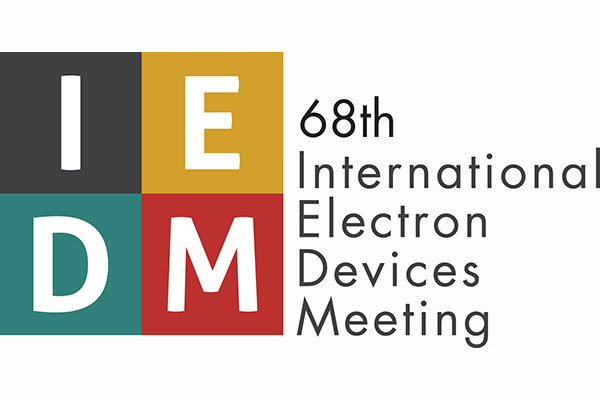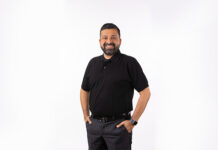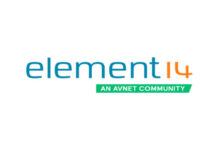SAN FRANCISCO, CA – For nearly seven decades, the IEEE International Electron Devices Meeting (IEDM) has been the place where the world’s best and brightest electronics technologists go to learn about the latest breakthroughs in semiconductor and related technologies. That tradition continues this year, when the 68th annual IEDM takes place at the Hilton San Francisco Union Square hotel from December 3–7, 2022.
“The 75th Anniversary of the Transistor, and the Next Transformative Devices to Address Global Challenges,” chosen to honor the industry’s historic achievements while unveiling and exploring today’s technical advances. The 2022 IEDM technical program will consist of more than 220 presentations plus many engaging panels, Focus Sessions, Tutorials, Short Courses, a career luncheon, supplier exhibit, IEEE/EDS award presentations and other events.
“The semiconductor industry has a higher profile in the world right now than perhaps at any other point in its history, and that makes the developments to be reported at the IEDM this year that much more impactful, because they will ultimately lead to products that make our lives better,” said Srabanti Chowdhury, IEDM 2022 Publicity Chair and Associate Professor of Electrical Engineering at Stanford University. “In terms of the technical trends which are evident in this year’s program, many of the accepted papers indicate a strong and growing interest in the use of 2D material systems for advanced, extremely scaled devices.”
“I also would like to point out that this is the first time in the IEDM’s long and storied history that the top three spots on the IEDM Executive Committee are held by women: Barbara DeSalvo of Meta Platforms is our General Chair; Dina Triyoso of TEL Technology Center America is our Technical Program Chair; and Kirsten Moselund of Paul Scherrer Institute/EPFL is our Technical Program Vice Chair,” Chowdhury said.
“This year’s technical program features presentations that explore the state-of-the-art in essentially every important semiconductor-related technology,” said Jungwoo Joh, IEDM 2022 Publicity Vice Chair and Process Development Manager at Texas Instruments, “A theme that runs through many of them is the need to deal with electrothermal considerations in extremely scaled devices, because thermal management goes hand-in-hand with reliability and performance.”
Here are details of the 2022 IEEE International Electron Devices Meeting:
Tutorial Sessions – Saturday, Dec. 3
The Saturday tutorial sessions on emerging technologies have become a popular part of the IEDM conference. They are presented by experts in the field to bridge the gap between textbook-level knowledge and leading-edge current research, and to introduce attendees to new fields of interest. This year there will be three time slots, each with two tutorials running in parallel:
1:30 p.m. – 2:50 p.m.
- FEOL Reliability: From Essentials to Advanced and Emerging Devices and Circuits, Ben Kaczer, IMEC
- Enabling Nanofabrication and 3D Integration Technologies for the Semiconductor Industry, Qiangfei Xia, Univ. Massachusetts
3:05 p.m. – 4:25 p.m.
- Resistive Memories-Based Concepts for Neuromorphic Computing, Elisa Vianello, CEA-Leti
- The Era of Advanced Packaging and Hybrid Bonding, Sitaram Arkalgud, Tokyo Electron
4:40 p.m. – 6:00 p.m.
- Innovations and Technologies for 2nm CMOS and Beyond, Tenko Yamashita, IBM
- Integrating Microfluidics and Electronic Chips: Technologies for In Vitro and In Vivo Clinical Diagnostics, Carlotta Guiducci, EPFL
Short Courses – Sunday, Dec. 4
In contrast to the Tutorials, the full-day Short Courses are focused on a single technical topic. Early registration is recommended, as they are often sold out. They offer the opportunity to learn about important areas and developments, and to network with global experts.
- High-Performance Technologies for Datacenter and Graphics to Enable Zetta-Scale Computing, organized by Ruth Brain, Intel
- Future of High-Performance Computing, Wilfred Gomes, Intel
- Energy-Efficient CMOS Scaling, Daewon Ha, Samsung
- Novel Logic Devices for Energy-Efficient Computing, Iuliana Radu, TSMC
- Heterogenous Integration and Chiplet Packaging, Subu Iyer, UCLA
- Process Architectures To Improve Power Delivery, Geert Hellings, IMEC
- Optical Interconnects, Vladimir Stojanovic, UC Berkeley
- Next-Generation High-Speed Memory for AI and High-Performance Compute,organized by Yih (Eric) Wang, TSMC
- High-Speed Memory for Future HPC and AI: Architecture to System Design, John Wuu, AMD
- High-Speed SRAMs for Future HPC and AI, Hidehiro Fujiwara, TSMC
- Next-Generation DRAM for HPC and AI, Kyomin Sohn, Samsung
- Future Prospects of In- and Near-Memory Computing, Naveen Verma, Princeton
- High-Speed Emerging Memories for AI and HPC, Shimeng Yu, Georgia Tech
- 3D Technologies for Memory-Compute Integration, Geert Van der Plas, IMEC
Plenary Presentations – Monday, Dec. 5
- Celebrating 75 Years of Transistor Innovation by Looking Ahead to the Next Set of Industry Grand Challenges, by Anne Kelleher, Executive VP/General Manager of Technology Development, Intel
- Expanding Human Potential through Imaging and Sensing Technologies, by Yusuke Oike, General Manager, Sony Semiconductor Solutions
- Enabling Full Fault-Tolerant Quantum Computing with Silicon-Based VLSI Technologies, by Maud Vinet, Quantum Hardware Program Manager, CEA-Leti
Luncheon – Tuesday, Dec. 6
There will be a career-focused luncheon featuring industry and scientific leaders talking about their personal experiences in the context of career growth. The speakers will be:
- Myung-hee Na, Vice President of SK Hynix’s Revolutionary Technology Center
- Prior to joining SK Hynix, Dr. Na was the VP of Technology Solutions and Enablement at IMEC. Dr. Na started her career at IBM in 2001, where she held various technical, managerial and executive roles until 2019. During that time, she was promoted to Distinguished Engineer and Technical Executive. At IBM Research, she successfully led R&D for multiple generations of semiconductor technologies, including high-K metal gate, FinFET, and nanosheet development. She received several Outstanding Technical Achievement Awards.
- Lisa Rutherford, Director of Research Science at Meta Reality Labs Research
- Prior to joining Meta, Lisa was a serial entrepreneur and investor, most recently serving as the co-founder and CEO of the Andreessen Horowitz-backed (the “a16z”-backed) company Ampersand and the bootstrapped company Coliloquy. She also founded Elodie Partners and served as President of virtual economy pioneer Twofish (acquired by Live Gamer) and as a venture capitalist, most notably with In-Q-Tel. Lisa is currently an advisor to Cendana Capital and BulletTime Ventures, as well as an angel investor in several startups.
Evening Panel Session – Tuesday evening, Dec. 6
A staple of the IEDM conference is the evening panel session, an interactive forum where experts give their views on important industry topics, and audience participation is encouraged to foster an open and vigorous exchange of ideas. This year’s panel will be moderated by Stefan De Gendt, Scientific Director at IMEC, and Suman Datta, Professor at Georgia Institute of Technology.
- “75 Years of Transistor Technology – (No) Time for Retirement?” On December 16, 1947 Walter Brattain and John Bardeen made the first working transistor, now known as the point-contact transistor. In January 1948, William Shockley demonstrated the junction transistor. This year we are fortunate to celebrate in person the historical 75th anniversary of this landmark invention that has brought the global semiconductor community together at the IEDM for decades. This will be an entertaining and insightful evening panel discussion on the importance and future of this vanishingly small and yet irreplaceable miracle technology for the next 75 years.
Vendor Exhibition/Poster Sessions
- A vendor exhibition will be held once again.
Further information about IEDM
For registration and other information, visit www.ieee-iedm.org.















